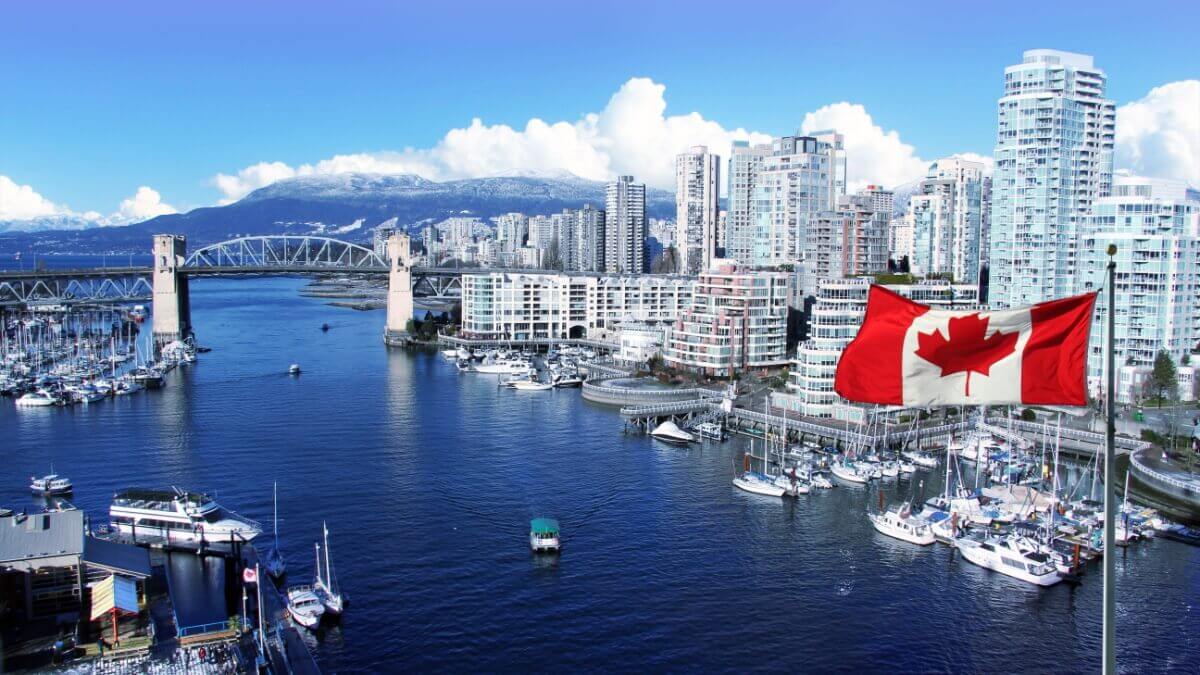Having A Baby In Canada? Hospital, Midwife, Delivery, And IVF Costs.
Expecting a new baby can quickly become stressful if you’re a foreigner living abroad. Every country has its own complex healthcare system. As an expat, you...

Pursuing a life in Canada, whether as a gap year between educational pursuits or for a longer stint due to work or other reasons, represents an exciting opportunity.
Canada’s cosmopolitan cities are on par with Australia in terms of friendliness, cleanliness and multiculturalism with the added benefit of expansive natural beauty almost everywhere you look.
From bright blue lakes surrounded by snow capped mountains to deep forests and pristine beaches, it provides an ideal place to explore the outdoors and is especially appealing to winter sports enthusiasts.
For anyone keen to make Canada their new home, this guide covers all the essentials such as visa types, healthcare, cost of living, finding employment and more.
| 💸 Keep over 40 currencies and get personalised account details for currencies like AUD, EUR, USD, GBP & CAD – Send and receive payments from abroad like a local |
|---|
Learn more about the
Wise Account
While there's a lot to cover if you’re thinking of moving to Canada from Australia — let’s start with a quick look at some key facts.
| Capital | Ottawa |
|---|---|
| Official Languages | French/English |
| Population | 38.93 million |
| Currency | Canadian Dollar (CAD) |
| Biggest cities | Toronto, Ontario, Montréal, Québec Vancouver, British Columbia, Ottawa |
| Weather | Cold winters and brief, cool summers in the northern regions. Cold winters and hot summers with minimal rain in the central to southern regions. |
| Government type | Constitutional monarchy, Parliamentary democracy |
| Average yearly salary (2022-2023) | Between CAD$55,000 to CAD$60,000 per year |
As seen on 3 May 2024
Canada frequently outperforms other nations in terms of standards of living. This includes areas such as income, jobs, education, health, environmental quality, social connections and overall life satisfaction.¹
It is known to be a friendly and welcoming country with a reputation for also being incredibly polite. Unemployment is low and access to high-level healthcare, education and related services is readily available.
Regularly voted as one of the most naturally beautiful landscapes in the world, it is an ideal place for those who love the outdoors. From surfing to hiking, skiing, snowboarding and more there is plenty to do in every season.
Day to day, finding your favourite foods and essentials is easy thanks to plentiful restaurants, grocery stores and retail shopping outlets. Within major cities, there is a variety of nightlife to enjoy, but expect it to be a little quieter in regional areas or smaller towns.
Below is a brief rundown of the pros and cons of moving to and living in Canada.
| Pros | Cons |
|---|---|
|
|
Before moving to Canada to live, it is worth noting that specific criteria must be met. These include³:
Break down into further subsections. Focus on a couple of popular visa types for those who intend to reside in the country permanently/long-term.
Each type should have a short blurb about them. We will link to the full articles from this section, so be brief.
Canada offers several different visa types with differing requirements for permanent and long-term stays. The three most common of these are⁵:
This is one of the fastest pathways to permanent residency and being able to live and work in Canada long-term. It is designed to increase the migration of skilled workers to Canada and strict eligibility criteria must be met.⁵
This visa targets immigrant entrepreneurs with the skills and potential to build businesses in Canada.
You must prove that your business will bring significant financial benefit to Canada’s economy and that you have enough funds to settle and support yourself in Canada while growing your business.⁵
This visa is specifically for skilled workers who want to become permanent residents of Canada and live in Quebec.⁵
Quebec has a special agreement on immigration with the Government of Canada with its own rules for how they choose immigrants. Proficiency in spoken French is necessary for anyone applying for this visa.
Only offered to countries with specific bi-lateral agreements with other nations, of which Australia is one, this visa allows those ages between 18 to 35 to live and work in Canada under one of three categories⁶:
While this visa is typically only valid for between 12 to 24 months, a secondary visa or pursuit towards residency can be made following this through one of Canada’s other visa offerings if application criteria is met.
It should be noted that there are different work permits associated with different visas and not all visas offer an immediate path to permanent residency.
Additionally, some visa classes may not immediately allow you to work in Canada without also applying for a linked work permit first.
We recommend speaking with Canada’s government immigration agency or a licensed immigration expert as needed for more detailed advice.
Yes, Canada is considered a safe place to live for Australians. While the country as a whole is largely considered very safe, data collected by the Canada Crime Severity Index shows the top five safest cities as being⁷:
You shouldn't feel compelled to limit yourself to these cities, however, as overall crime is low in most areas.
By adhering to regular safety precautions such as remaining aware of your surroundings and keeping your doors locked, you’re unlikely to experience this first-hand.
Canada has two official languages, French and English. While English is primarily spoken nationwide, in the province of Quebec, French is the sole official language and spoken by the majority of people living there.
If you intend to live in Quebec, it is strongly recommended to learn French and a language component may make up part of your visa application if moving to this province or hoping to work there.
Learning French is something that can be done before you move or while living in Canada. You’ll likely find that the accent and idioms used in Quebec French do differ from European French so you may like to find a local tutor to help with this as needed.
Canada has excellent healthcare facilities that are similar to what you’d expect in Australia. There is comprehensive medical care available through hospitals in cities and towns, and smaller doctors' clinics and medical centres in more regional areas.
Depending on the province or territory you settle in and your visa or work permit type you may have access to Canada’s public healthcare system.⁸ The exception to this is the IEC visa which dictates that you must have medical insurance.⁶
Regardless of your visa or permit type, it is still recommended to take out your own private health insurance when moving to ensure you can access any services you need quickly and without incurring unexpected costs.
Canada is often reported as having a high cost of living, however, this is usually when judged against European nations or the USA.
However, compared to Australia, the cost of living may be lower, particularly rental costs, though this does depend on where you choose to settle.
The following table outlines monthly average living expenses for a couple living in some of the most popular cities.⁹
All prices quoted in Canadian Dollars.
| Toronto | Vancouver | Quebec City | Ottawa | Calgary | |
|---|---|---|---|---|---|
| Rent | $1527 | $1543 | $864 | $1347 | $1222 |
| Utilities (electricity, phone, internet) | $330 | $296 | $247 | $320 | $389 |
| Groceries | $890 | $908 | $842 | $890 | $968 |
| Transport (car) | $720 | $799 | $670 | $720 | $681 |
As seen on 3 May 2024
Finding employment in Canada is fairly straightforward and follows a similar process to Australia.
You can look for work:
There are many websites you can use to find current job listings in Canada.
Job Bank is a government employment platform specifically geared towards newcomers to Canada.
Other popular sites include:
Don't forget to look out for more specific sites that list jobs within a particular region, for example, Toronto Jobs and BCjobs (for British Columbia).
Speaking with a recruitment agency, particularly one that specialises in your area of expertise can help you line up a new job more quickly. They may even have information on jobs not yet listed online.
Researching companies you’d like to work for and contacting them directly regardless of whether they have any jobs listed is also worth trying. You never know when they might be on the lookout for new talent.
Putting yourself out there and making friends and new connections may provide job leads or make you aware of potential job openings in your area of expertise.
Attend any public industry events or job fairs too as these are great networking opportunities.
Moving to a new country usually means needing to open a local bank account, major banks in Canada where you may like to open an account include:
Opening an account shouldn’t be too complex but while you may be able to provide key documentation such as identification, most require a residential address within Canada to process your application.
This may mean you need to wait to apply until you’ve already moved, check each bank's terms and conditions to find out more.
Moving to Canada represents an incredible opportunity for any Australian, however, you should keep in mind:
Should you need to speak with a Canadian embassy or expert contact about your proposed move, you can contact them as follows:
High Commission of Canada, Canberra
Consulate General of Canada, Sydney
Moving to Canada whether in the short or long term is a genuine possibility for many Australians with multiple visa pathways to consider.
Offering a similar culture and shared values, Canada is well suited to anyone who loves the outdoors, doesn't mind the cold and who wants to settle in a safe country with good healthcare and education.
An enviable new life awaits!
Opening a bank account overseas can be a bit of a process that’s made more difficult if you aren’t considered a resident yet.
The Wise Account from Wise — while not a bank account — enables you to store 40 international currencies and get local account details for a number of different countries, including AUD, CAD, GBP, NZD, EUR and USD. You can use these to easily transfer your money to Wise or get paid by others. However, do note that features that are offered by traditional bank accounts such as interest, loans and in some countries, deposit protection, will not be available with the Wise Account. See how Wise safeguards your money.
You’ll also avoid high international transaction fees and get access to the mid-market rate on all conversions. The best part - you can open and manage your Wise account completely online.
To make everyday spending easier you can order a Wise Debit card for your Wise Account and generate virtual cards as needed. If you have the local currency in your Wise Account the Wise card will use it. If you don’t have local currency converted, it uses smart technology to auto-convert your money at the mid-market rate, for a transparent conversion fee.
Join over 16 million customers currently using Wise.
Register your Wise Account
in minutes
| Please see Terms of Use for your region or visit Wise Fees & Pricing for the most up-to-date pricing and fee information. |
|---|
Sources:
Sources checked on: 03 May 2024
*Please see terms of use and product availability for your region or visit Wise fees and pricing for the most up to date pricing and fee information.
This publication is provided for general information purposes and does not constitute legal, tax or other professional advice from Wise Payments Limited or its subsidiaries and its affiliates, and it is not intended as a substitute for obtaining advice from a financial advisor or any other professional.
We make no representations, warranties or guarantees, whether expressed or implied, that the content in the publication is accurate, complete or up to date.

Expecting a new baby can quickly become stressful if you’re a foreigner living abroad. Every country has its own complex healthcare system. As an expat, you...

The Great White North is a popular destination for tourists from all over the world, as well as expats. With its progressive politics, stunning natural...

Canada has beautiful natural scenery, universal healthcare and progressive politics. Read on to learn all about the pros and cons of living in Canada.

With universal healthcare, a socially progressive government, and easy access to all kinds of stunning natural scenery, it’s no wonder Canada is a country...

Moving to Canada? Or perhaps you’re a Canadian living abroad. Either way, you might be looking into taking the next step and confirming your allegiance to...

There are a lot of reasons to consider Canada as a potential new home. The Great White North has some of the most affordable higher education in the world,...